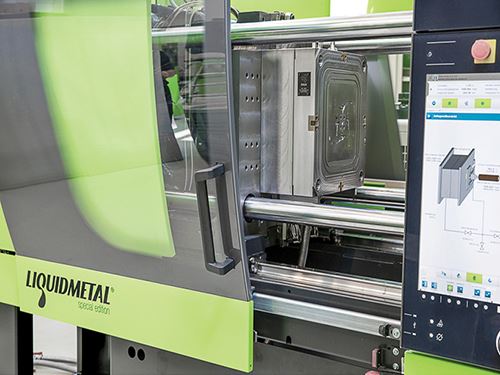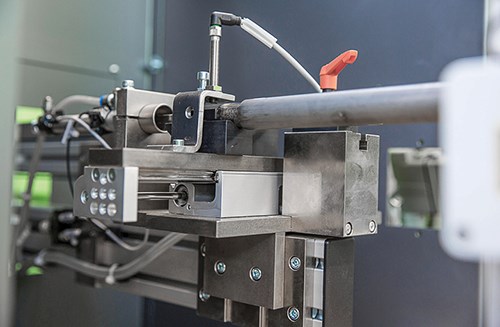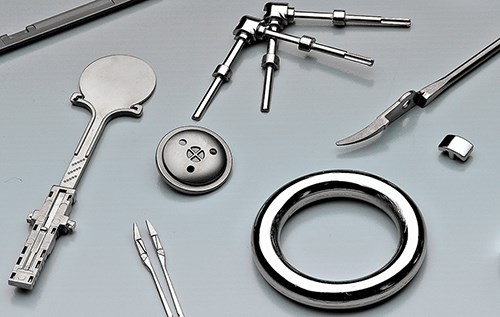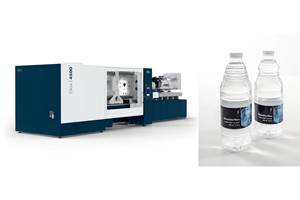Engel Shines Spotlight on Liquid Metal Molding
Liquid Metal Injection Molding
During its triennial symposium in Austria, the machine builder molded medical forceps parts from a novel liquid-metal alloy.
Every three years, injection machine manufacturer Engel (U.S. office in York, Pa.) invites customers and partners to its facilities in picturesque Austria to present technology innovations for injection molders. On June 16-18, more than 3000 molders from all over the world attended the Engel Symposium 2015 at the company’s machine plant in St. Valentin and the Design Center in Linz.
There were plenty of highlights, such as the recently extended Engel easix robot series and enhancements to its iQ weight-control software. But the biggest showstopper during the symposium was surprisingly not a plastic application, but rather metal. For the first time, Engel demonstrated injection molding of metal alloys using technology from Liquidmetal Technologies, Rancho Santa Margarita, Calif. Engel is the exclusive machine partner of Liquidmetal.
Liquidmetal is a class of zirconium alloys that feature an amorphous, non-crystalline structure, which is why they are referred to as metallic glasses. Components made from these materials are extremely hard, but at the same time very elastic, which leads to very good recovery behavior. For example, the elasticity of steel is 0.2% and is 1% for titanium, while the value for components made of Liquidmetal alloys is 2%. In addition, the materials are characterized by their low specific weight and excellent corrosion resistance. This range of characteristics predetermines the alloys for use in precision components that are subjected to high mechanical stresses.
Discovered by researchers at the California Institute of Technology, Liquidmetal controls the intellectual property rights with more than 70 U.S. patents.
During the technical presentations, Gerhard Dimmler, Engel’s senior vice president of R&D, addressed just why the company got involved in this new technology: “The processing is very close to the injection molding process—it’s a useful complement to our core technologies,” he says. Additionally, it provides the company with additional market access.
NEW INJECTION MOLDING MACHINE
Still, processing Liquidmetal alloys is not an easy endeavor—particularly because in the molten state it is highly reactive to oxygen. For this reason, Liquidmetal alloys must be processed quickly and under a highly controlled vacuum. With that in mind, Engel developed a new injection molding machine based on its all-electric machine series, the Engel e-motion. The company says that the difference between a Liquidmetal machine and a conventional injection press lies mainly in the injection unit. Instead of a screw, the machine relies on a piston that injects the molten metal alloy into a thermo-regulated mold.
The Liquidmetal alloys are available in the form of slugs cut from round rods. These blanks are automatically fed into a chamber, where the material is melted inductively under high vacuum conditions. Very rapid cooling with exclusion of oxygen leads to forming of the amorphous structure. Standard robots, such as the Engel viper series, are used to remove the finished parts. The sprue can be removed with the help of a water-jet cutting machine or mechanical shears.
With Liquidmetal, Engel is presenting an alternative to metal injection molding (MIM) and CNC machining. Unlike those other processes, the machine can produce Liquidmetal parts in 2-3 min. In addition, there is no waste accumulated in Liquidmetal processing because the sprues can be recycled.
POTENTIAL APPLICATIONS
During the symposium, Engel molded parts for medical forceps with Liquidmetal alloy. The company says it chose to showcase that product because it sees good potential for Liquidmetal technology in the field of medical technology. For instance, endoprostheses like hip joints or stents are also possible with Liquidmetal. Engel also foresees it being used in electronics, aerospace, military technology, and sports equipment.
Liquidmetal is expensive, which could place some limits on its use. It costs about $110/kg, and the maximum shot weight is 100 g. Of that, approximately 20 g is required for the sprue, resulting in a maximum part weight of 80 g.
Liquidmetal has a license with Apple, Cupertino, Calif., news that generated a lot of attention for the material. While Apple has yet to incorporate Liquidmetal’s bulk amorphous alloy technology into any of its devices, it did recently extend its exclusive rights to Liquidmetal for another year, according to the U.S. Securities and Exchange Commission.
Liquidmetal also has a license agreement with Swiss jewelry maker Swatch to use the material for watches. The licenses for the new method are obtained from Liquidmetal Technologies, with Engel delivering its injection molding machinery to licensed partners.
Related Content
What to Look for in High-Speed Automation for Pipette Production
Automation is a must-have for molders of pipettes. Make sure your supplier provides assurances of throughput and output, manpower utilization, floor space consumption and payback period.
Read More3D Printed Spine Implants Made From PEEK Now in Production
Medical device manufacturer Curiteva is producing two families of spinal implants using a proprietary process for 3D printing porous polyether ether ketone (PEEK).
Read MoreKrones Acquires Netstal
Krones adds PET preform injection molding to its bottle blowing and filling capabilities, as well as cap molding and expansion into medical, food and other markets.
Read MoreCompact Solution for Two-Component Molding
Zahoransky’s new internal mold handling technology foregoes the time, space and money required for core-back, rotary table or index plate technologies for 2K molding.
Read MoreRead Next
Lead the Conversation, Change the Conversation
Coverage of single-use plastics can be both misleading and demoralizing. Here are 10 tips for changing the perception of the plastics industry at your company and in your community.
Read MorePeople 4.0 – How to Get Buy-In from Your Staff for Industry 4.0 Systems
Implementing a production monitoring system as the foundation of a ‘smart factory’ is about integrating people with new technology as much as it is about integrating machines and computers. Here are tips from a company that has gone through the process.
Read MoreSee Recyclers Close the Loop on Trade Show Production Scrap at NPE2024
A collaboration between show organizer PLASTICS, recycler CPR and size reduction experts WEIMA and Conair recovered and recycled all production scrap at NPE2024.
Read More

























